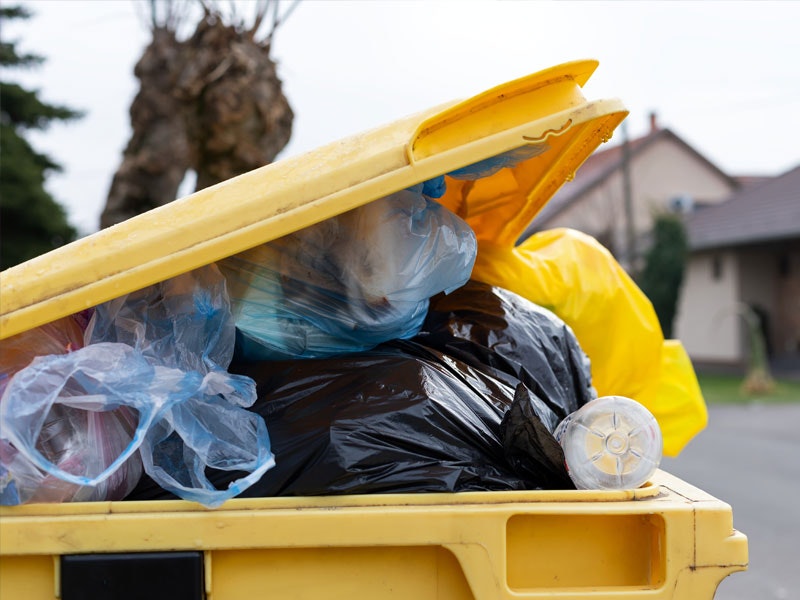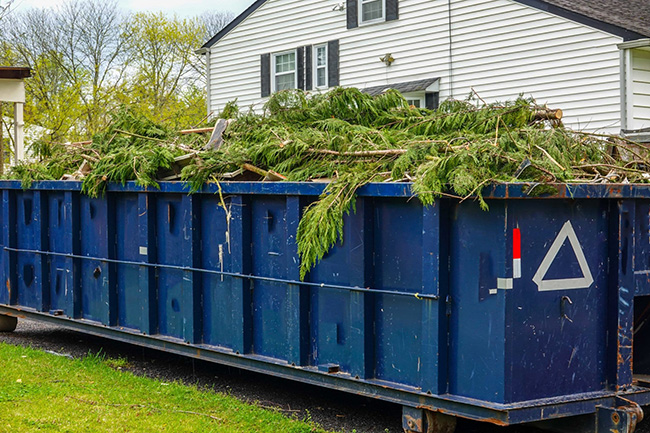Dumpster rentals are a great option when you’re tackling a big cleanup. But not everything is allowed inside. Some items can pose safety risks or lead to unexpected fees.
This quick guide breaks down what to avoid, so you can clear out the junk without any trouble—or surprise charges.
What Can You Not Put in a Dumpster Rental?
You can’t put hazardous waste, electronics, tires, batteries, medical waste, flammable items, or asbestos in a dumpster. These need special disposal or recycling options.
Key Takeaways
- You can’t toss hazardous, electronic, or medical waste in a dumpster.
- Stuff like tires, batteries, and appliances also need special handling.
- Throwing banned items can lead to fines or canceled pickups.
- Use recycling centers, drop-off programs, or pro services instead.
- Always ask your dumpster company if you’re unsure what’s allowed.
Restricted Items by Category
- Hazardous Household Waste

Got leftover paint or a half-used bottle of bleach? Don’t toss it in the dumpster. Products like paint thinners, bleach, ammonia, and some cleaners can leak, ignite, or violate landfill regulations.
The fix? Most cities run special drop-off days. You bring the sketchy liquids, they take care of the disposal. Easy win.
- Electronics and Appliances
Got a busted flat screen or a fridge that quit during a heatwave? Those can’t go in a dumpster either. Electronics often contain lead, mercury, or batteries that can turn toxic real fast.
Recycling centers are your cheat code here. Some stores even take old gadgets off your hands. If it’s big like a fridge, check with local scrap guys. They’ll usually haul it and handle the rest.
- Tires and Car Parts
Rolling up with old tires? Hard no. Tires are landfill nightmares. They trap gases, float up through the dirt, and mess with compaction. That’s why it’s crucial to follow Tire disposal rules Temecula to ensure they’re properly disposed of. Car batteries, engines, and brake pads? Same story—lots of toxic gunk inside.
What now? Auto shops and tire stores often have recycling programs. Some even give you a few bucks per tire. Call ahead, make the swap, keep it clean.
- Medical Waste and Medications
That expired bottle of antibiotics or box of old syringes? Definitely not dumpster-friendly. Medical stuff can spread illness, contaminate water, and flat-out freak out waste workers.
Solution: Pharmacies often have bins for expired medications. For needles, search for a ‘sharps disposal program’ in your area. Proper handling prevents injuries and protects sanitation workers.
- Construction Waste with Asbestos or Lead
Tearing out old drywall? If it’s from before the ’80s, there’s a chance it’s packing asbestos or lead. That dust? Serious health risk if it breaks loose. Definitely not casual dumpster material.
The move here is to call in a certified removal crew. They’ll bag it up in hazmat suits like a scene out of Breaking Bad and make sure it ends up in the right spot.
- Propane Tanks, Gasoline, and Other Flammables
Gas cans, lighter fluid, propane tanks—anything flammable shouldn’t go in a dumpster. Even a small spark can cause a dangerous fire.
Most hardware stores or recycling centers offer drop-offs for flammables. Propane tanks? Swap them out at the store. You hand over the old one, they give you a fresh fill. No drama.
- Batteries (Big Ones and Rechargeables)
That AA battery might look innocent, but throw it in with trash and you risk leaks or even fires. Bigger ones like car batteries or lithium packs? That’s a hazard waiting to happen.
Good news: most electronics stores and supermarkets have battery drop bins near the entrance. Car batteries? Auto shops are your go-to. They’ve got the gear to deal with them safely.
- Contaminated Soil or Absorbent Materials
Let’s say you cleaned up a fuel spill or dealt with moldy insulation. That dirt or soaked-up mess is considered contaminated. Tossing it could get you hit with serious fines.
Call your local waste authority. They’ll point you to facilities that can take it. You might need special bags or permits, but it’s better than a legal headache later.
- Mattresses and Box Springs (In Some Areas)
Yeah, it’s not hazardous—but a lot of places don’t want mattresses in dumpsters. They’re bulky, hard to crush, and slow down processing at transfer stations.
Many cities run bulky item pickups or have mattress recycling centers. If it’s clean and just gently used, you might even find donation spots that’ll take it off your hands.
- Freon-Containing Items
Fridges, air conditioners, and dehumidifiers are on the do not dump list unless they’ve been cleared of freon. That stuff messes with the ozone and needs special recovery.
Want it gone? Contact a certified technician to remove the refrigerant. Then you can junk the shell safely. Some cities offer free pick-up programs if you prep it right.
- Dead Animals or Biological Waste
Morbid but real—don’t throw roadkill, expired meat, or any kind of bio waste into the dumpster. That’s a health code violation and a full-on biohazard.
Local animal control or vet offices usually have proper disposal methods. If it’s meat, your city might allow it in the regular trash (double-bagged), but check first.
- Liquids (in Bulk)
Dumpsters aren’t built to hold liquids. They leak, pool, and cause all sorts of cross-contamination issues. We’re talking motor oil, paint, chemicals, or even gallons of soda.
Try a household hazardous waste program or look for specific recycling centers that accept bulk liquids. Some motor oil places will even let you dump it for free.
- Yard Waste (in Some Cities)

Surprise: in some cities, dumpsters don’t take yard clippings, leaves, or branches. Local landfills keep them out for composting programs or fire control reasons.
You’ve got options. Most places offer green bins or yard waste bags for pickup. Composting it yourself? Bonus points for being the eco-friendly guy on the block.
- Big Loads of Food Waste
A few scraps? Sure. But tossing a fridge’s worth of leftovers? Not so much. Food waste in bulk attracts pests and smells brutal once it heats up in the dumpster.
Some cities have food waste recycling programs or composting sites. If not, break it into smaller amounts and double-bag before adding it to your regular trash.
- Pressure-Treated Wood (Older Stuff)
If your deck came down and the wood smells like chemicals, don’t toss it straight into a dumpster. Old pressure-treated wood can contain arsenic—yep, the poisonous kind.
Take it to a construction and demolition (Camp;D) landfill that handles treated wood. They’ll make sure it gets processed safely.
- Weapons or Ammunition
It may seem unlikely, but firearms, ammunition, and fireworks have been found in dumpsters. These are highly dangerous and should never be disposed of this way.
Contact local law enforcement or a firearm dealer for proper disposal. They’ll know how to disarm or recycle them without turning it into a news headline.
What Happens If You Throw Prohibited Items in a Dumpster?
You’ll probably get hit with a fine. Most dumpster rental companies inspect the contents. If they find prohibited items, you’ll be charged a fee—and it’s rarely inexpensive.
- Your pickup might get canceled
If the driver sees something sketchy, they might not haul it. Then you’re stuck with a full dumpster and no plan B.
- It can cause safety or legal issues
Toss the wrong thing, and it could leak, explode, or break laws. Not exactly a flex.
- What to do instead?
Quick fix: ask your rental company what’s allowed. If you’ve got hazmat stuff, hit up a local drop-off center. There’s always a better move than sneaking stuff in.
How to Properly Dispose of These Items Instead
- Hazardous stuff? Hit up your local drop-off
Most cities have a hazardous waste day. You bring the sketchy liquids, they handle the danger. No guessing, no mess.
- Electronics and batteries? Recycle those bad boys
Best Buy, Staples, even Target have bins for dead tech and batteries. Easy drop, no guilt.
- Tires, car parts, or old oil? Call a mechanic
Auto shops usually recycle tires and fluids. Some even give you store credit. That’s a quiet flex.
- Appliances or fridges? Check for freon first
If it’s got freon, call a certified tech before ditching it. After that, scrap it or let your city haul it.
- Medications? Pharmacies have your back
No sketchy sink dumps. Most pharmacies take old pills. Look for the tiny bin near the counter.
- Construction junk with asbestos? Call the pros
This one’s non-negotiable. Asbestos is a health risk. Let certified crews handle it with hazmat vibes.
Frequently Asked Questions
1. Can I throw away paint cans?
Only if they’re totally empty or dried out. If there’s liquid left, hit up your local hazardous waste site.
2. What about old TVs or electronics?
Nah, those usually need e-waste recycling. Best Buy or your city’s drop-off center has your back.
3. Can I toss a fridge or AC unit?
Not unless it’s been cleared of refrigerants. EPA rules aren’t a suggestion.
4. Are tires a no-go?
Yeah, they’re landfill kryptonite. Most tire shops will take them for a small fee.
5. How do I get rid of stuff that’s banned?
Easy. Look for city collection events, donate it, or call a specialty hauler to take it off your hands.
Keep It Clean, Keep It Legal
Dumpsters are a solid move for big cleanups, but they’re not a free-for-all. Tossing banned stuff could cost you—literally.
If you’re not sure what flies, hit up your rental company first. Quick convo, no surprises. Stay smart, skip the fines, and let the pros deal with the toxic junk.